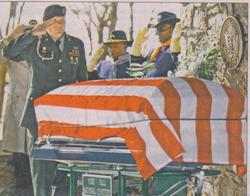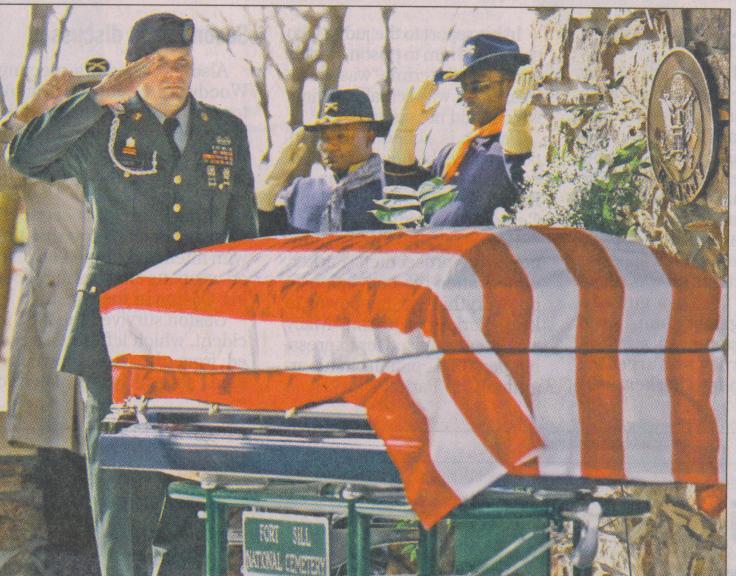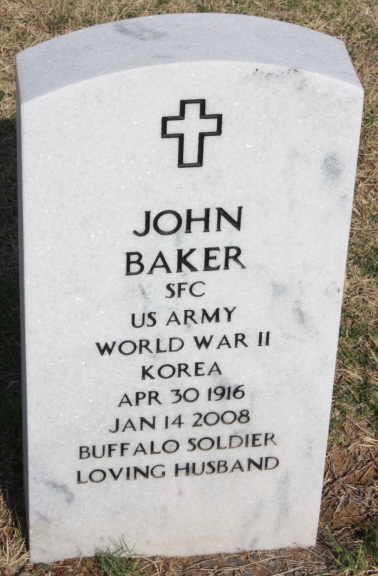Lawton - One of the U.S. Army's last surviving Buffalo Soldiers was buried Tuesday at Fort Sill National Cemetery, being remembered as "a statesman, gentleman and a soldier."
JOHN BAKER, who served with the famed all-black regiment at the end of World War II, died Jan. 14, 2008, after a long illness. He was 91.
"Most of what we did has been left out of Oklahoma history," Union Baptist Church pastor C.W. Whitlow said in a eulogy. "And most of what Mr. Baker did was history."
A Texan by birth in 1916, Baker joined the Civilian Conservation Corps as a young man, and enlisted in the U.S. Army in 1939. In 1943, he was assigned to the 9th Cavalry Regiment at Fort Clark, Texas, beginning what would become a short stint as a famed Buffalo Soldier.
Baker participated in the North African campaign before the 9th Cavalry Regiment was inactivated in 1944, ending a 78-year history of all-black regiments in the aftermath of the Civil War.
"Mr. Baker was very proud of being a Buffalo Soldier, but he rarely talked about it," said Troy Banks, a longtime friend and admirer. "He would always graciously accept praise from others, but he would never boast of it himself. He was the epitome of humility."
Banks once arranged for Baker to record oral histories of his life at Cameron University in Lawton. Baker backed out of the project at the last minute.
"He faced a lot of racism in his life, and yet I never heard him speak one racist word," Banks said. "Like Martin Luther King, he was a peaceful man. He didn't see any point in stirring up bad feelings."
Retired Command Sgt. Major Tiger Gaines first met Baker years after Baker was honorably discharged from the Army in 1959, and the two became close friends.
"He often compared the way things used to be with how they are now," Gaines said. "He told me back when he was stationed at Fort Sill, he would go to the movies on post. The white soldiers were always allowed in first, and then the black soldiers could go in and find whatever was left in the balcony.
"He was proud of me because I was in charge of a whole platoon...He paved the way."
Baker established a modest janitorial business in the years following his military service and built it into a thriving business that operated until 1990.
But horses remained his real passion. Gaines said Baker became a driving force behind the annual Armed Forces Rodeo and the All-American Heritage Rodeo, held in conjunction with Black History Month. Baker and his wife, Juanita, also founded the Lawton Silver Spurs Riding Club and maintained a prosperous cattle ranch in his hometown of Clarksville, Texas.
Banks said Baker rode "straight and tall in the saddle" into his 80s.
"He loved his horses," said Ravienne Summers, Baker's granddaughter.
Baker routinely saddled his prized horses, Lady and Diamond, until the day he fell ill.
"He really didn't talk much about being a Buffalo Soldier," said Juanita Baker, his wife of 69 years. "He would talk about it sometimes with me, but I was there with him, and we went through it together.
"I'd like people to remember him as a peaceful man," she said. "He provided for his family and always tried to make things easier for everybody.
Lawton - One of the U.S. Army's last surviving Buffalo Soldiers was buried Tuesday at Fort Sill National Cemetery, being remembered as "a statesman, gentleman and a soldier."
JOHN BAKER, who served with the famed all-black regiment at the end of World War II, died Jan. 14, 2008, after a long illness. He was 91.
"Most of what we did has been left out of Oklahoma history," Union Baptist Church pastor C.W. Whitlow said in a eulogy. "And most of what Mr. Baker did was history."
A Texan by birth in 1916, Baker joined the Civilian Conservation Corps as a young man, and enlisted in the U.S. Army in 1939. In 1943, he was assigned to the 9th Cavalry Regiment at Fort Clark, Texas, beginning what would become a short stint as a famed Buffalo Soldier.
Baker participated in the North African campaign before the 9th Cavalry Regiment was inactivated in 1944, ending a 78-year history of all-black regiments in the aftermath of the Civil War.
"Mr. Baker was very proud of being a Buffalo Soldier, but he rarely talked about it," said Troy Banks, a longtime friend and admirer. "He would always graciously accept praise from others, but he would never boast of it himself. He was the epitome of humility."
Banks once arranged for Baker to record oral histories of his life at Cameron University in Lawton. Baker backed out of the project at the last minute.
"He faced a lot of racism in his life, and yet I never heard him speak one racist word," Banks said. "Like Martin Luther King, he was a peaceful man. He didn't see any point in stirring up bad feelings."
Retired Command Sgt. Major Tiger Gaines first met Baker years after Baker was honorably discharged from the Army in 1959, and the two became close friends.
"He often compared the way things used to be with how they are now," Gaines said. "He told me back when he was stationed at Fort Sill, he would go to the movies on post. The white soldiers were always allowed in first, and then the black soldiers could go in and find whatever was left in the balcony.
"He was proud of me because I was in charge of a whole platoon...He paved the way."
Baker established a modest janitorial business in the years following his military service and built it into a thriving business that operated until 1990.
But horses remained his real passion. Gaines said Baker became a driving force behind the annual Armed Forces Rodeo and the All-American Heritage Rodeo, held in conjunction with Black History Month. Baker and his wife, Juanita, also founded the Lawton Silver Spurs Riding Club and maintained a prosperous cattle ranch in his hometown of Clarksville, Texas.
Banks said Baker rode "straight and tall in the saddle" into his 80s.
"He loved his horses," said Ravienne Summers, Baker's granddaughter.
Baker routinely saddled his prized horses, Lady and Diamond, until the day he fell ill.
"He really didn't talk much about being a Buffalo Soldier," said Juanita Baker, his wife of 69 years. "He would talk about it sometimes with me, but I was there with him, and we went through it together.
"I'd like people to remember him as a peaceful man," she said. "He provided for his family and always tried to make things easier for everybody.
Family Members
Sponsored by Ancestry
Advertisement
Explore more
Sponsored by Ancestry
Advertisement




